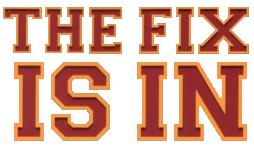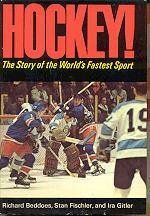NHL Referees Admitted the League was Fixed
Hockey! The Story of the World's Fastest Game
was first published in 1969. Written by Richard Beddoes (sports columnist for the Toronto Globe & Mail), Stan Fischler (sports writer for The Village Voice, The Sporting News
and Sport Magazine), and Ira Gitler (associate editor for Down Beat), the book was for the most part your typical rundown of the history of the NHL...until the reader reached a chapter titled "The Troubles of the NHL." Remarkably, within this chapter were direct quotes from former NHL referees who stated matter of factly that the league directed them to not only keep games close, but at times, dictate the outcome of games. Perhaps not surprisingly, the latter editions of this book omitted this chapter and the information contained within it. But for those interested, here are some of the most startling quotes taken directly from the (somewhat rare) 1969 first edition which I recently found.
The authors begin the chapter with: "To hundreds of thousands of youngsters in the United States and Canada hockey merely is a sport to be played and watched, studied and enjoyed—especially if the home team wins. Even adult fans have a perfectly natural tendency to overlook the fact that hockey is more than just a pastime. Yet the truth of the matter is that hockey is considerably more than a sport. It is a big business and it has grown bigger since World War II and reached transcontinental proportions in 1967 when the National Hockey League expanded from six to 12 teams.
"Like most big businesses hockey rarely is fun to the people closely involved with the game. In fact it is run just like any other business; and, just like any other business it has its seamier side that too often is overlooked by those who are the supposed sentinels and chroniclers of hockey. There is a distinct similarity in the manner in which a big government attempts to manage news and the style in which big league hockey barons handle probing newsmen. As far back as the twenties and thirties, the bosses of hockey seeked [sic] to control the media whenever possible...." (page 305)
"Red Storey wrote an article for a national magazine and declared: 'The NHL is becoming a circus and the referees are the clowns.' His former colleague, Dalton McArthur, added: 'All teams were to be treated as equals, but some teams were more equal than others'." (page 307)
Former NHL referees Red Storey and Dalton McArthur along with Toronto Globe and Mail
writer Scott Young (who claimed to have been removed from “Hockey Night in Canada” by the league) were brought together on the CBC’s “Question Mark” program in the early 1960s to probe beneath “the superficialities of hockey” and how they were each “the targets of retribution” from the NHL. The authors of Hockey!
saw fit to include the entire transciption of that television program. Below are direct quotes pulled from their transcript.
Young on being ousted from Hockey Night in Canada: “They don’t want anybody who questions their motives, no matter how phony their motives are, they don’t want anybody who questions their motives, appearing on what most people, six million people in Canada every Saturday night, think is a pretty straightforward sort of a program.” (page 310)
McArthur: “If you think it’s [vaudeville] dead, you should come down between periods to the dressing room of the referees. It’s just a complete vaudeville act, hoax, bunkum, whatever you want to call it….” (pg 310)
McArthur then talked about a NY Rangers v. Boston Bruins game which the Rangers needed to win to get into the playoffs for the first time in several years as they were ahead of the Red Wings by just a point for the 4th and final playoff spot: “Before the game started, Carl [Voss, Referee-in-Chief of the NHL] walked into the room, there was about 10 minutes to go I guess before the game started, and he turned to me and he said, ‘As you know out there, the one team is fighting for the playoffs and there’s another team that hasn’t got a hope of making them and I want you to go out there and any penalties that you call against New York must be good penalties.’ [That was to say, clear, undeniable fouls]. Now I have no doubt in my mind that what he meant me to do was ease up on New York, in other words, give every break I could to New York so that they could get into the playoffs.” (pg 311)
After the program aired, more was said by Storey (even though he attempted to retract what he said on that CBC program).
Storey: “When I first entered the league I was told if there were any breaks going, to give them to the home team. When I was told this I suggested to Mr. Campbell that if the home team won each game the teams would wind up tied for first place. He said: ‘Well, there’s nothing wrong with that.’ What they don’t want is the weak teams to be hurt too much by penalties.” (pg 327)
NHL President Campbell was asked about this statement to which he responded, “I agree with it completely. I can say it better than that. I have an expression which I use all the time and he (Storey) knows it: Justice triumphs only when the home team wins.” (page 327)
If this was the NHL's stance in the 1960s, what makes fans think anything within the league changed since then? Once a cheat, always a cheat.

